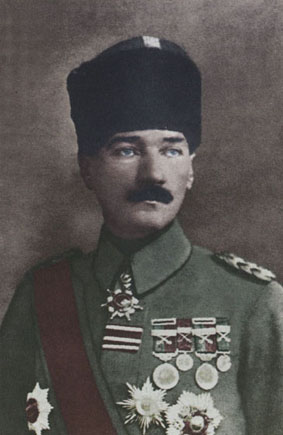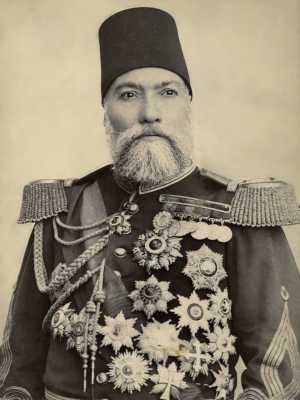Pasha
Title for a high-ranking official in the Ottoman Empire and other Muslim countries
Pasha (Lua error in package.lua at line 80: module 'strict' not found.
, Lua error in package.lua at line 80: module 'strict' not found.
) was a high-ranking title in the Ottoman Empire and other Muslim countries. The title was used to denote a person of high rank or office, often equivalent to the rank of a general or governor. The title was one of the highest in the Ottoman political and military system, second only to the Sultan.
Etymology[edit | edit source]
The origin of the word "Pasha" is uncertain. It is believed to have derived from the Persian word "pādshāh" (king, ruler) or from the Turkish word "baş" (head, chief). The title was used as a mark of respect and authority.
Historical Context[edit | edit source]
The title of Pasha was first used in the 14th century during the reign of Orhan, the second ruler of the Ottoman Empire. It became more prominent during the reign of Mehmed II, also known as Mehmed the Conqueror, who expanded the use of the title to include military commanders and provincial governors.
Roles and Responsibilities[edit | edit source]
Pashas held various roles within the Ottoman administrative and military systems. They could be appointed as:
- Beylerbey (provincial governor)
- Vizier (high-ranking political advisor)
- Kapudan Pasha (admiral of the navy)
- Serasker (commander-in-chief of the army)
Pashas were responsible for maintaining order, collecting taxes, and overseeing the administration of their respective regions. They also played crucial roles in military campaigns and were often involved in the Ottoman military hierarchy.
Notable Pashas[edit | edit source]
Several notable figures in Ottoman history held the title of Pasha, including:
- Sokollu Mehmed Pasha - Grand Vizier under three sultans
- Köprülü Mehmed Pasha - Founder of the Köprülü political dynasty
- Gazi Husrev-beg - Governor of Bosnia and a prominent military leader
Decline and Legacy[edit | edit source]
The use of the title Pasha declined with the fall of the Ottoman Empire in the early 20th century. However, it continued to be used in some countries, such as Egypt and Sudan, until the mid-20th century. Today, the title is mostly of historical significance and is used in a cultural context to refer to individuals of high status or respect.
Related Titles[edit | edit source]
See Also[edit | edit source]
- Ottoman Empire
- Ottoman military ranks
- Ottoman administration
- List of Ottoman titles and appellations
| Ottoman Empire | ||||||||||||||||||||||||||||||
|---|---|---|---|---|---|---|---|---|---|---|---|---|---|---|---|---|---|---|---|---|---|---|---|---|---|---|---|---|---|---|
|
Search WikiMD
Ad.Tired of being Overweight? Try W8MD's physician weight loss program.
Semaglutide (Ozempic / Wegovy and Tirzepatide (Mounjaro / Zepbound) available.
Advertise on WikiMD
|
WikiMD's Wellness Encyclopedia |
| Let Food Be Thy Medicine Medicine Thy Food - Hippocrates |
Translate this page: - East Asian
中文,
日本,
한국어,
South Asian
हिन्दी,
தமிழ்,
తెలుగు,
Urdu,
ಕನ್ನಡ,
Southeast Asian
Indonesian,
Vietnamese,
Thai,
မြန်မာဘာသာ,
বাংলা
European
español,
Deutsch,
français,
Greek,
português do Brasil,
polski,
română,
русский,
Nederlands,
norsk,
svenska,
suomi,
Italian
Middle Eastern & African
عربى,
Turkish,
Persian,
Hebrew,
Afrikaans,
isiZulu,
Kiswahili,
Other
Bulgarian,
Hungarian,
Czech,
Swedish,
മലയാളം,
मराठी,
ਪੰਜਾਬੀ,
ગુજરાતી,
Portuguese,
Ukrainian
Medical Disclaimer: WikiMD is not a substitute for professional medical advice. The information on WikiMD is provided as an information resource only, may be incorrect, outdated or misleading, and is not to be used or relied on for any diagnostic or treatment purposes. Please consult your health care provider before making any healthcare decisions or for guidance about a specific medical condition. WikiMD expressly disclaims responsibility, and shall have no liability, for any damages, loss, injury, or liability whatsoever suffered as a result of your reliance on the information contained in this site. By visiting this site you agree to the foregoing terms and conditions, which may from time to time be changed or supplemented by WikiMD. If you do not agree to the foregoing terms and conditions, you should not enter or use this site. See full disclaimer.
Credits:Most images are courtesy of Wikimedia commons, and templates, categories Wikipedia, licensed under CC BY SA or similar.
Contributors: Prab R. Tumpati, MD






